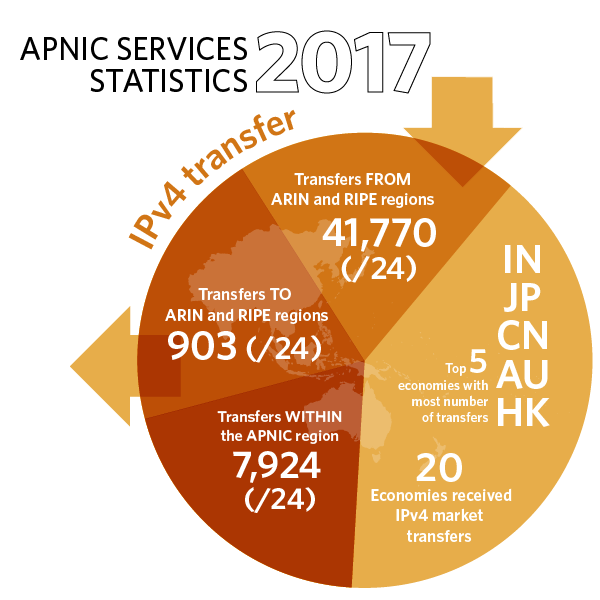
Last year, a record number of IPv4 addresses were transferred into the APNIC region — over 10.6 million — thanks to the reciprocal inter-RIR transfer policies between APNIC, ARIN and RIPE NCC.
APNIC Members who have already received IPv4 address delegations from the APNIC 103/8 IPv4 and non-103/8 Recovered IPv4 address pools now rely on transfers to fulfil their IP addressing needs – a fact that is leading to such record transfer figures.
While this is enabling organizations to expand their networks using idle address space and appears to be increasing the number of addresses that are routed, there are questions about the impact these are having on the network operation.
Cross-region resource management
At APRICOT 2018, I chaired a panel session to discuss such questions, in particular asking if there’s any problem in identifying who’s in charge of which address space when it comes to cross-region resource verification and management.
Anurag Bhatia (Hurricane Electric), Martin Levy (Cloudflare), Aftab Siddiqui (ISOC), and APNIC’s Geoff Huston shared their observations on the situation and discussed ways to improve the Internet number registry, by encouraging network operators to adopt best practices in publishing resource and routing information, and using newer tools such as RDAP and RPKI.
Anurag started the discussion, explaining the methods and reasons why ISPs check ‘who holds what addresses’: they do it when adding new peering connections, advertising prefixes from customers with independent IP addresses, and in day to day trouble shooting. The main tools being used to check allocations are the whois and IRR (Internet Routing Registry) databases.
Anurag sees no significant impact of address transfers in network operations, but incorrect or missing whois records remain a key challenge.
Martin explained that Cloudflare has addresses from all RIRs for administration and transit purposes, and while they have tried to use each resource within its original region, there are times when they’ve had to use resources in other regions. There are no technical hurdles in doing so, everything works just fine as it should. However, they are having to deal with geolocation issues with transferred addresses — the geolocation database is often behind in reflecting the most recent address transfers.
Aftab focused on the need for network operators to follow best practices in routing, mentioning how greater adoption of MANRS can improve overall routing security. Relevant to this point, is the need to encourage everyone to publish their resource and routing information that can be globally validated, either in the form of IRR objects, or cryptographically verified RPKI ROAs.
Geoff then reminded us of the importance of having a globally accurate registry of Internet numbers, that require close coordination among the five RIRs, and making it easy for people (and machines) to use.
The session concluded that IPv4 address transfers haven’t created any new network operation problems, other than occasional geolocation issues. However, the discussion highlighted the need to keep improving the Internet number registry to meet today’s environment and demands.
APNIC will continue to focus on providing an accurate, high quality Internet number registry database, taking advantage of technologies such as RDAP and RPKI.
You can watch the session below.
The views expressed by the authors of this blog are their own and do not necessarily reflect the views of APNIC. Please note a Code of Conduct applies to this blog.


nice